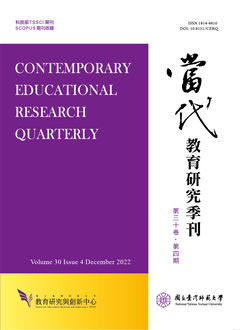

研究目的
過去研究依自我決定理論多探討心理支持透過心理需求滿足預 測適應性動機涉入之適應性路徑,少著墨其不適應性層面。近期研 究發現心理支持/控制為不同向度,心理需求滿足/挫敗為不同向 度,不能相互推論,故本研究採變項、個人中心分析父母心理支持 /控制、心理需求滿足/挫敗、適應性/不適應性動機涉入之關係。
研究設計/方法/取徑
本研究以國二 833 名學生為樣本,以結構方程模式、集群與變異數分析。
研究發現或結論
(1)心理支持/控制、心理需求、動機涉入關係模式適配;(2) 父母心理支持正向預測心理需求滿足較強,負向預測心理需求挫敗 較弱或無預測力;父母心理控制正向預測心理需求挫敗較強,負向 預測心理需求滿足較弱或無預測力;(3)心理需求滿足正向預測適應性動機涉入較強,負向預測不適應性動機涉入較弱或無預測力; 心理需求挫敗正向預測不適應性動機涉入較強,負向預測適應性動 機涉入較弱或無預測力;(4)父母心理支持/控制組型分低質、低 量、高質組,高質組為最適應,較支持「質」的觀點。
研究原創性/價值
(1)發現父母心理支持、控制對孩子適應性、不適應性變項不 同強弱的預測效果,顯示其背後運作機制不同。(2)了解真實情境 中父母心理支持/控制組型狀況,父母需留意教養品質(質觀點), 非僅是涉入越多越好(量觀點)。
教育政策建議或實務意涵
父母欲提升孩子適應性狀態,減少對孩子的心理控制效果不大, 增加對孩子的心理支持效果才強;父母欲降低孩子不適應性狀態, 增加對孩子的心理支持效果不強,減少對孩子的心理控制效果才大。
Purpose
Past studies based on self-determination theory have mostly focused on adaptive path analyses (rather than maladaptive path analyses) by exploring the predictive effect of psychological support on adaptive motivational engagement through psychological need satisfaction. Recent studies, however, have found that psychological support and control are distinct dimensions, and that psychological need satisfaction and thwarting are as well. In this study, variable- centered and person-centered analyses were adopted to explore the relationships among parental psychological support/control, psychological need satisfaction/thwarting, and adaptive/maladaptive motivational engagement.
Design/methodology/approach
The participants were 833 junior high school students. Structural equation modeling, cluster analyses, and analyses of variance were used.
Findings/results
The following results were obtained: (a) The model of psychological support/control, psychological needs, and motivationalengagement fitted the observed data well; (b) parental psychologicalsupport as compared to parental psychological control was a strongerpredictor of psychological need satisfaction; parental psychological control as compared to parental psychological support was a strongerpredictor of psychological need thwarting; (c) psychological needsatisfaction as compared to psychological need thwarting was astronger predictor of adaptive motivational engagement; psychologicalneed thwarting as compared to psychological need satisfaction was a stronger predictor of maladaptive motivational engagement, and(d) the cluster analyses of the psychological support/control profiles revealed three parenting profiles: a poor quality group, a low quantitygroup, and a good quality group. The good quality group was foundto be the most adaptive, and the findings generally supported that thequality of parenting matters.
Originality/value
Parental psychological support and control had different effects on children’ level of adaption and maladaptation. The quality of psychological support/control profiles was more important than thequantity of psychological support/control profiles.
Implications for Policy/Practice
Increasing parental psychological support is a better way to increase children’s level of adaption than reducing parentalpsychological control; reducing parental psychological controlis a better way to decrease children’s level of maladaptation than increasing parental psychological support.

本著作係採用創用 CC 姓名標示-非商業性 3.0 台灣 授權條款授權.
本刊國立台灣師範大學教育研究與創新中心
106台北市和平東路一段162號 | 電話: 02-7749-3670 | E-mail: cerecerq@gmail.com
教創中心 | 師大 | 電子報 | 線上投審系統
本刊由國家科學及技術委員會人文社會科學研究中心補助經費
© 2014 CERI-NTNU
